 On our October 3, 2011 show of Radio Basics, we talk with former inmate John Gaskins, Minister of Information of the New Afrikan Black Panther Party – Prison Chapter
, about the
“finger-bending technique”
torture being practiced at Red Onion State Supermax Facility, the same facility housing Kevin ‘Rashid’ Johnson, Minister of Defense, NABPP-PC.
On our October 3, 2011 show of Radio Basics, we talk with former inmate John Gaskins, Minister of Information of the New Afrikan Black Panther Party – Prison Chapter
, about the
“finger-bending technique”
torture being practiced at Red Onion State Supermax Facility, the same facility housing Kevin ‘Rashid’ Johnson, Minister of Defense, NABPP-PC.
Listen to this show here, or click the bottom of your BASICSnews.ca browser to listen to the show streaming directly from our website.
Also in this show, short audio segment on solitary confinement, headline news and music from Filipino-American hip-hop group, Power Struggle.
DONATE TO CHRY DURING THE 2011 FUNDRAISING DRIVE – CHECK THIS OUT
BASICS Community News Service - Published Sep. 2011
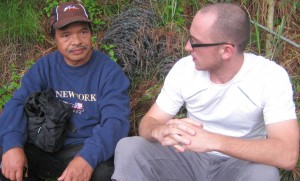
“The national oppression of indigenous people in the Cordillera has reached ethnocidal proportions” - Simon 'Ka Filiw' Naogsan, Spokesperson of the Cordillera People's Democratic Front (Image of Ka Filiw with Steve da Silva of BASICS, in Mountain Province).
On August 1, 2011, journalist Steve da Silva with the people’s media organizations BASICS Community News Service (Toronto, Canada) interviewed Simon ‘Ka Filiw’ Naogson, the Chairperson of the Cordillera People’s Democratic Front (CPDF), an underground and revolutionary mass alliance of indigenous people and organizations in the Cordillera region and a member organization of the National Democratic Front of the Philippines.
Ka Filiw discussed the increasing militarization, mining plunder, and national oppression facing the indigenous people of the Cordillera as the US-Aquino regime approves more mining concessions for the region and consequently intensifies its Oplan Bayanihan counter-insurgency campaign to repress the revolutionary movement.
The interview with Ka Filiw was conducted in the western region of Mountain Province, Cordillera in an undisclosed location, given the underground status of Ka Filiw’s activities. It was conducted as part of a forthcoming book by Steve da Silva, People’s War in the Cordillera, an in-depth look at the people’s resistance and revolutionary struggle in from the vantage point of one region in Mountain Province, Cordillera within the overall context of the revolutionary movement in the Philippines.
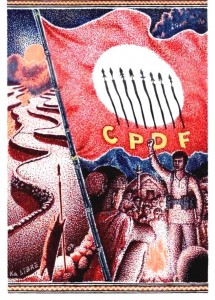
Art from 'Ka Libre' of the Leonardo Pacsi Command (Mountain Province) of the New People's Army. The eight spears of the CPDF logo represents the eight ethno-linguistic tribes that make up the Igorot indigenous people.
Steve da Silva / BASICS: Can you tell us what Cordillera People’s Democratic Front (CPDF) is, including its relationship to the people’s struggles in Cordillera, and to the broader revolutionary movement in the Philippines?
Ka Filiw / CPDF: The CPDF was founded in 1981, it launched its Political Congress in 1987, and its Organizational Congress in 1989 and ever since then it has been in operation. The CPDF is the revolutionary united front of all the national minorities and non-minorities in the Cordillera. There are three features of the CPDF. First, it stands as the National Democratic Front in the Cordillera. Second, it as an alliance of all revolutionary mass organizations in the Cordillera. Third, it acts as the people’s revolutionary government in areas where the revolutionary movement is building and consolidating.
The revolutionary struggles being launched by the CPDF in the Cordillera is closely linked with the National Democratic Revolution. First and foremost, because we are all Filipinos. We cannot detach the struggles of the Cordillera peoples and the indigenous peoples from the struggles of the Filipino peoples. Such being the case, our revolutionary struggle here in the Cordillera is directly linked with the National Democratic Revolution. Of course, secondarily, we are waging a struggle to address the historical national oppression suffered by the national minorities and indigenous people here in the Cordillera. Read more…
by Steve da Silva, BASICS Community News Service (Published September 2011) www.basicsnews.ca
On August 13, 2011, BASICS interviewed Gwendolyn Longid , an indigenous Igorot activist and a leading organizer with the Cordillera People’s Alliance in Sagada, Mountain Province. We discussed the struggles of the Cordillera people against imperialist mining plunder and the U.S.-Aquino regime’s militarization of the region under the banner of its ‘Oplan Bayanihan’ counter-insurgency scheme. Longid also explained the difference between the bogus ‘autonomy’ that the national government is trying to impose upon indigenous people versus the genuine self-determination and defense of ancestral domain that the peoples of the Cordillera are struggling for.
This interview is part of the research for a forthcoming book by Steve da Silva,
People’s War in the Cordillera
, an in-depth look at the people’s resistance and revolutionary movement in the Cordillera within the overall context of the revolutionary movement in the Philippines.
Steve da Silva / BASICS: Can you briefly describe the structure and political work of the Cordillera People’s Alliance?
Gwendoyln Longid / CPA: We have a General Assembly that is made up of members from different provinces and chapters and it elects our Executive Committee. We also have chapters in Kalinga, Benguet, Baguio City, Mountain Province, and Abra, each of which also has its own Executive Committees. We are both a mass organization and an alliance, since we have not only organizations who are part of the CPA but also individuals. CPA Mountain Province has a membership of 37 people’s organization in over 10 municipalities, as well as several other IP [indigenous people's] advocates.
The political work of the CPA is for the defense of our ancestral land and our self-determination. Since the early 1960s when ‘national minorities’ of the Cordillera first faced the threats of the Chico River Dam Projects under the US-Marcos Dictatorship, the CPA has been working to empower indigenous peoples.
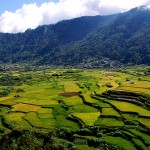
Aerial view of the Sagada rice terraces. The rice terraces of the Cordillera are recognized UNESCO world heritage sites for their masterful feats in engineering and agricultural.
From the point of view of the national government, all land with a slope of over 18% or 10.2º degrees is declared public land, making 81.4% of the land in the Cordillera state-owned, or at least that’s their claim. Of course, the indigenous people have a very different point of view on this, considering this is their ancestral land. So the CPA is struggling to defend this ancestral lands. Read more…
 “Boycott the Elections” – a discussion on the boycott campaign of Canada’s Federal Elections – April 4, 2011
“Boycott the Elections” – a discussion on the boycott campaign of Canada’s Federal Elections – April 4, 2011
On the show tonight, we speak with the Toronto-based organizers of the “Boycott the Elections” campaign unfolding across cities throughout Canada, Josh Moufawad-Paul and Louise Jones. See boycott2011.ca for details.
“We are Jose” Refugee Campaign / Pharoahe Monch, Interviewed by BASICS – March 28, 2011
On this show, we are joined live in the studio with by refugee claimant Jose Figueroa (and his son Jose Ivan), who has been living in Canada for over 14 years and now faces a deportation order for his past affiliation with the FMLN of El Salvador. Jose and Jose Jr. have been hitchhiking across Canada to inform people about Canada’s move to criminalize those
To listen to the shows, click here (right click to open in a new window)
Check us out on the radio at 105.5FM in Toronto or on the web www.chry.fm , Mondays @ 8PM .
For the archive of our past shows, visit www.radio4all.net and search ‘Radio Basics’.
In this show, we talk to Anti-Racist Action member Jason Devine about the home invasion he suffered at the hands of neo-Nazis on the night of Nov 7-8, while his four children and wife were in the house. The Nazi thugs beat him and another friend with bats, hammers, and other blunt weapons. We discuss fascist and anti-fascist politics across Canada and throughout history.
In this show, on the eve of the trial that may send Mumia Abu Jamal back to death row, we review his case, listen to some of his most recent radio commentaries, and play some musical tributes to the brother we all know to be innocent. Read more…
On Friday, March 26, 2010, BASICS Editor S. da Silva caught up with G1 and Rodstarz of the South Bronx Chilean hip-hop group Rebel Diaz. Rebel Diaz was in town to perform at Barrio Nuevo’s benefit concert ‘Chile Can Rise’ – a fundraising initiative to raise money for grassroots people’s organizations in Chile rebuilding their society after the February 27 earthquake.
BASICS : Thanks a lot for agreeing to this interview with BASICS.
G1 : Always man – thanks for having us. It’s not the whole crew – it’s two-thirds of Rebel Diaz, but it’s a pleasure for us to be here. We’re from Chile, so it’s important for us to be here supporting the grassroots efforts to help the people out in Chile.
Rodstarz : Blessed to be here – we always down for community radio.
Read more…
On the current economic crisis and the struggle for democracy and socialism against imperialist globalization.
On August 9, 2009, the BASICS Free Community Newsletter Editor S. da Silva interviewed José Maria “Joma” Sison, the chief political consultant to the National Democratic Front of the Philippines, a founder of the central organizations of the revolutionary movement in the Philippines – namely, the Communist Party of the Philippines and the New People’s Army – and the current Chairperson of the International League of People’s Struggles, an alliance of more than 350 people’s organizations from more than 30 countries.
BASICS linked up with Joma at the NDFP office in Utrecht, Netherlands to talk about the current economic crisis and the international struggle for democracy and socialism against imperialist globalization. The following is an edited transcript of the interview.
BASICS : Joma, thank you for meeting with BASICS.
Joma : Thank you too for having me.
B : The past year has been witness to the unfolding of one of the most grave crises in the history of capitalism, and this coincides with the worsening of the capitalist world food crisis, military aggressions and occupations, and a scale of environmental destruction approaching catastrophic proportions. What are the economic roots of these crises and how can they be resolved? Read more…
February 2009, by Makaya
Melodic’s New Video for “Ride On”
Jamaican-born, Canadian-raised and Brooklyn-based singer Melodic is doing it all for the people. Melodic has shared the stage with such greats as Dead Prez, Tupac, Buju Banton, Mos Def and Heavy D to name a few and he has established himself as one of New Yorks most innovative up and coming artists. His music is a blend of Reggae, Soul and Hip Hop (dubbed ‘Reggae Soul Hop’) and he is currently in the process of recording his second album. BASICS had the chance to meet up with him at a recording session and talk about life and music.
BASICS: How long have you been doing music?
Melodic: Forever. It is my purpose.
B: What has had the greatest influence on your music?
M: Life. My life. The things around me. My mistakes. Life has always been the greatest inspiration and always will be.
B: You were born in Jamaica, grew up between Calgary and Toronto and have lived in New York for the past 12 years. What are the major differences you see between the three societies?
M: Well from a health perspective, in Jamaica you can live off the land, while up here people live mostly off fast food so as far as living a healthy life goes, Jamaica is where it’s at. But for work opportunities, New York is where it’s at.
As far as politics go, in Jamaica politics are different from here. It’s an all out war. Guns, machetes, violence. The people are killing each other in the name of different political parties.
In the US and Canada, politicians persuade the people to vote for them by telling them pure lies, but at least we’re not killing each other for them like in Jamaica.
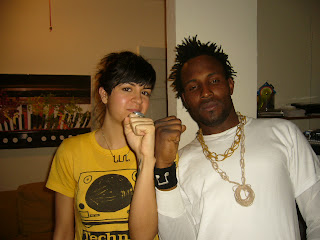 B: What do you think about Obama?
B: What do you think about Obama?
M: Well I’m not on the black and white thing and I don’t believe in any politician no matter what he looks like. Some people are celebrating this as a really great moment in history, but I’d rather get my 40 acres and a mule than a black president that’s giving us false hopes of change, because at the end of the day he’s a politician on the side of the other politicians and can’t be for the people.
B: Tell us about Brooklyn and what you see as the major issues the people are facing.
M: Too much police, no work, rent increases, a lot of homelessness and all of this contributes to the high crime rate… The issues facing poor people in New York City are endless.
B: If you could, how would you change this?
M: If I was in a position to make a change on a larger scale than now I would create a system where every family is given the same amount of money to cover all living expenses. Give the people a real way to survive. Right now there’s no balance. Most people are working just to survive and pay off debts while the others live in luxury. I think if we all had the same opportunities a lot of problems in our society would be elevated.
B: Tell us about your music and how you see it creating change.
M: First of all, I give what I get from the world. And I create change with my music by singing things that inspire people and make them want to keep on and stay strong. As far as going out there and saying that I’m going to stop the war or end poverty, I would be fighting a losing battle. I will definitely create a spark to inspire that to happen, but those issues are not things I can fight alone and have to be fought collectively. I’m down with the people who believe in doing the same.
B: Your latest video for your song ‘Ride On’ has created a big buzz in New York and the concept is fresh. Can you tell us about it?
M: The song is basically telling people to keep going even when times are rough and just ride on. The concept is ‘I’m not homeless, just not home yet’ and since I myself have ‘not been home yet’ I just act out what it’s like to be in that situation and echo the lyrics of the song and show the reality of the streets, but in such a way to inspire people in that situation and to create change. Though this is a universal problem, being in New York you see everything and the video is capturing New York from a different perspective than we’re used to seeing in the media and bringing a voice to the voiceless. All the people in the video are real people, not actors and at the same time that we are talking about such an ugly issue as homelessness, the video is showing the beauty of the people.
B: So what’s next for Melodic?
M: Keep making music with longevity. I still haven’t written my best song. And I want to bring Reggae music to the forefront and have it recognized by the Grammy’s and the mainstream media so we can take it to new heights. Me and my bredren Nachy Bless have created the Reggae Soul Hop style that is bridging the gap between the different genres of music.
I’m going to finish up this album, tour and just keep writing music good music to uplift the people.
B: Thank you for taking the time to speak with us today.
M: Not a problem. Jah Bless. Keep up the great work. Straight Yoza!
Go to www.myspace.com/melodicvibe or www.yozavibe.com to hear Melodic’s music and check out his new video for ‘Ride On’. Look out for more from this artist in the very near future.*
-Makaya
by Makaya
Basics #11 (November 2008)
Basics Community Newsletter has expanded its work by venturing into the world of radio broadcasting. Basics is pleased to be hosting our very own show on CHRY 105.5FM in the Jane and Finch area, every second Wednesday from 8-9pm. Live-to-air broadcasting is just another way we are getting our vital information to the masses. The show combines live interviews, music, current news issues, reports from recent events, as well as listings for upcoming events and much more.
For our debut show we interviewed Odion Osegyefo from the African Internationalist Students Organization and the African People’s Socialist Party; Chris Bolton, a Toronto District School Board Trustee who has come out against armed cops in Toronto schools; and investigative journalist Kevin Pina, who discussed the current situation in Haiti after Hurricane Ike in the context of ongoing political repression by the foreign occupation forces. Since then we have held many interviews, including a phone interview with Jennifene Debassige, the mother of the young Native man slain by Toronto Police, Byron Debassige. We also interviewed local musicians and community activists, such as the Soca Emperor and Wasun from Black Action Defense Committee.
On our October 15 show, we featured Venezuelan rap group Familia Negra, who were in our studio to discuss the Bolivarian Revolution in Venezuela, Hugo Chávez, and to perform some freestyle; and we also interviewed Will Prosper of Montréal-Nord Republik to discuss the popular resistance to police terror in the community. We have also been providing important updates on the current crisis in the global economy, and how capitalism’s richest billionaires are attacking people around the world and in Canada in order to keep themselves rich.
Radio Basics reflects many of the topics featured in our paper and issues unfolding in our communities. Radio Basics is from the people, and to the people, and this show is truly is revolutionizing radio! If you have not yet had the chance to hear the new audio component of the Basics Free Community Newsletter, tune in every other Wednesday from 8-9pm on 105.5 CHRY or online at www.chry.fm, or visit basicsnewsletter.blogspot.com to check out our audio library of past shows. Radio Basics will be airing its next shows on Nov. 12, Nov. 26, Dec. 10, and Dec. 24.
Interview by S. da Silva
Basics Issue #10 (Aug/Sep 2008)
On the 30th anniversary of Philadelphia police’s terroristic siege on the MOVE organization on August 8, 1978, Basics linked up with MOVE member Ramona Africa . Ramona Africa is the only living adult survivor of the Philadelphia police’s second major attack on MOVE’s home in 1985, where 11 people died, five of whom were children. The following is a transcript from our interview with her.
Basics : Ramona Africa, can you tell us about MOVE and its history?
Ramona Africa:
The MOVE organization is a revolutionary organization founded by a man called John Africa. John Africa brought people together from all different religious, political,
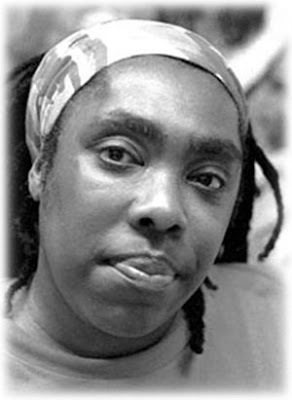 socio-economic backgrounds and made us a family, cementing the bond of our family with one common belief and that belief is life. Whether it’s the air, water, the earth that feeds us, human life, animal life, plant life – all life – is important and is our priority. Toward demonstrating our belief, our first public demonstrations were at the zoo, at the circus, at unsafe boarding homes for the elderly, at the reservoir and water treatment plant, at meetings held by DuPont chemicals, corporations like that who poisoned the environment…
socio-economic backgrounds and made us a family, cementing the bond of our family with one common belief and that belief is life. Whether it’s the air, water, the earth that feeds us, human life, animal life, plant life – all life – is important and is our priority. Toward demonstrating our belief, our first public demonstrations were at the zoo, at the circus, at unsafe boarding homes for the elderly, at the reservoir and water treatment plant, at meetings held by DuPont chemicals, corporations like that who poisoned the environment…
Basics : How long ago was that?
Ramona Africa: This was in the early 1970s. Because we demonstrated and put out such clear information about the wisdom of John Africa, the government started hearing what we were saying and seeing our example. They wanted to stop us from waking people up and setting an example for people. They initially tried to co-opt us by offering us by offering us funding and offices. But we made it clear that we didn’t want anything from them and we didn’t need anything from them. So when they couldn’t use that soft soap with us they came with the iron fist of brutality. When we would set up a peaceful demonstration at some institution of this system, they would come and tell us that we couldn’t demonstrate. We confronted them about it and said “Why, what are you talking about? Isn’t this America where people have freedom of speech, freedom of assembly, freedom to protest? Does the constitution say, except MOVE?” Of course, they didn’t want to hear that, so that’s when the beatings began. Our brothers would be beaten bloody into broken limbs and consciousness; pregnant MOVE women would be beaten, stomped, kicked into miscarriage. MOVE took a strong position after this continuously happened. We said “We are a peaceful people, we are uncompromisingly opposed to violence. But we’re not confused and we’re not stupid. We understand clearly, based on the teachings of John Africa, the difference between violence and self-defense. We don’t believe in violence, but we do believe in self-defense. That is the law – the law of life. There is not a species on the face of this earth that does not instinctively defend itself when attacked. You’re not violent if you defend yourself, but you are violent if you are attacked and you refuse to defend yourself because then you’re encouraging violence, perpetuating violence. Because then you are masochistic, self-destructive, suicidal, and MOVE is none of those things. So when we made our position clear, the government really got its back up, because they didn’t want us influencing people with that kind of understanding and information. At that point, they just determined that they had to get rid of us, anyway they had to, even if it meant killing us. And that’s what the first major police attack on MOVE on August 8, 1978 was really all about. Read more…